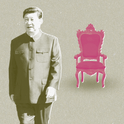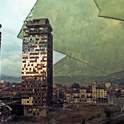On 20th February, Stephen Schwartz, the first United States ambassador to Somalia for 25 years, visited the capital Mogadishu to congratulate newly-elected President Mohamed Abdullahi Mohamed, known as “Farmajo.” Schwartz (appointed by Barack Obama) presented Farmajo with a gift: a blue-and-white cap with the slogan “Make Somalia Great Again.” When I first saw the photo of their meeting, I assumed it was a spoof from the Onion. Somalia had just been listed as one of seven Muslim-majority countries whose citizens Donald Trump wanted to ban from entering the US. But then the US Mission to Somalia proudly tweeted it, leaving Somalis dumbfounded at how an American diplomat could make light of the situation.
Somalia is a country of 10m people, plagued by corruption, jihadi violence and—most recently—a devastating famine. Farmajo has described the current drought, the country’s third in the last 25 years, as a “national disaster.” The United Nations has said that conditions in the region amount to the world’s “largest humanitarian crisis” since 1945. Sixteen million could be affected across four East African countries including South Sudan, Kenya and Ethiopia. In Somalia, 2.9m people are at immediate risk. When Foreign Secretary Boris Johnson met Farmajo in March, he pledged £110m to help. But continuing violence means little aid is delivered to the worst affected areas.
Faced with so many problems how will Farmajo fare in the world’s toughest job? Some Somalia-watchers are cautiously hopeful—more so than they have been about previous leaders. Farmajo’s unusual background and academic demeanour provide some optimism that he might, if not make Somalia great, at least start to drag it out of its quagmire.
Born in 1962, he got the nickname “Farmajo”—a corruption of “formaggio”—because he loved Italian cheese as a child, the food known from the time when Somalia was an Italian colony. His father was from a well-connected clan and studied in Italy. Like him, Farmajo went abroad and was in the US when the first rumblings of war began in his homeland in 1988. Based in Buffalo, New York State, he managed to claim asylum and eventually become a citizen. Living the American dream as the refugee made good, Farmajo stayed with his family in suburban Grand Island, where one of his jobs was Commissioner for Equal Employment at the State Department of Transportation.
Usually migrants favour the Democratic Party but Farmajo registered as a Republican. Joel Giambra, a former Republican County Executive and a close friend, met him in 1999. Farmajo helped get him support in the local Muslim community. Giambra described him to me as a “quiet, humble and committed” man, known for his powerful advocacy of his own community. “He helped people assimilate in the western New York state area; he was considered a leader in his community, outspoken, visible and he was there for his people.” Although settled in the US, Farmajo always talked about returning. “He had a laser-like focus on Somalia,” said Giambra, and wanted to put the knowledge he had gained in Buffalo to use back home.
When he won the election in February, the whole city was delighted but especially the African community. Despite their affection for him, the diaspora was puzzled why a Somali refugee would join a party which has often shown such little regard for migrants. But those connections might help him now. Apparently, Farmajo believes he can convince Trump that there is no need to end refugee resettlement, or for a travel ban. He can speak to Americans as a fellow American. Farmajo’s concern with fighting Islamists in Somalia will also serve him well. Giambra says that Farmajo told him many times that “fighting terrorism was a major focus for him. The best way to deal with terrorism in the US was to deal with it in Somalia.”
After returning to Somalia in 2010, he became prime minister and was generally popular—helped by the fact he was not involved in the civil war that broke out after the state collapsed in 1991. In 2012 he founded the Tayo Political Party (TPP). Earlier this year, he ran on a populist anti-corruption ticket against the incumbent President Hassan Sheikh Mohamud, who was accused of buying votes. Somalia’s presidential elections are supposed to be one-person one-vote. But due to the security threat posed by the jihadi group al-Shabaab, the country’s ninth president was chosen by members of parliament. Politicians chose Farmajo by voting in an aircraft hangar at Mogadishu’s international airport. Despite his clean image, his victory was likely not free from corruption.
Nonetheless, Farmajo is not a typical Somali politician, says Ahmed Soliman of Chatham House. “There’s something about him that inspires people, he can move in a different tack from his predecessors.” Steely, determined and quiet, Farmajo inspires many Somalis with his pledge for unity and a tough stance against its much larger neighbours Ethiopia and Kenya. The excitement is genuine. Somalis are some of the world’s most scattered people and when he won, expats from Nairobi to Minneapolis, Oslo to Leicester gathered to wave their flags and sing national songs. He even has a rap song dedicated to him.
Abdirashid Hashi, Director at Heritage Institute for Policy Studies (HIPS) in Mogadishu and a former top civil servant in Somalia who has known Farmajo for several years, says: “I would say Farmajo comes across as friendly, down-to-earth, genuine. And these reasons are why Somalis of all political persuasions, clan affiliations and demographic and geographical differences like him… he does not come across as philosophical, an ideologue or bookish, he is a practical man, who seems to have a feel for what the average Somali wants.”
But Somalia has been here before. Since 1991, at least 14 international attempts have been made to bring peace and stability to Somalia. All have failed.
The country only became a unified state in 1960 when Italian Somaliland merged with British Somaliland to create a composite nation known as Somalia. Though democracy briefly flourished it was ended in a military coup led by General Mohamed Siad Barre in 1969. Barre’s regime was a paragon of post-colonial brutality until the state collapsed in 1991—when the country came to be known as a place of chaos, famines and war. Somaliland to the north west declared its independence but that has never been recognised. Both the US and the UK closed their embassies in Mogadishu. A US intervention associated with the failed capture of rebel faction leader Mohamed Farrah Aidid in 1993—which saw dead US soldiers dragged through the streets in the Black Hawk Down incident, pushing the US into its most isolationist posture since Vietnam—Somalia has been used as the textbook case of a “failed state.” But in recent years Somalia has transitioned from a “failed” to a “fragile” state.
"Politicians chose Farmago in an aircraft hangar near the airport in a way unlikely to have been corruption free"The expectations on Farmajo’s shoulders are intimidating. According to Transparency International, Somalia remains—for the tenth year in a row—the most corrupt country in the world. He has admitted that bringing stability could take 10 to 15 years—a luxury he does not have. The public euphoria is likely to collapse into bitter disappointment unless he addresses some of Somalia’s many challenges immediately—the most urgent of which are the drought, security and the economy.
Somalia has experienced famines before but not on the scale that may be about to unfold. Though technically speaking we are not at a famine stage. According to Peter de Clercq, the UN Deputy Special Representative and Humanitarian Coordinator for Somalia, the lack of rainfall and the conflict have made the drought unusually bad. “Millions depend on humanitarian assistance and humanitarian agencies face access restrictions to some of the hardest hit areas.” While we wait for famine to be officially declared, it may be too late for Somalia’s children. In 2011, during the last famine, at least 130,000 people died—half of them children—before it was official.
Another key challenge is the fight against al-Shabaab. Though in recent years the group has been pushed away from urban areas and no longer controls the key strategic Kismayo port, it remains one of Africa’s most potent terrorist groups. In 2013, it attacked the Westgate Shopping Mall in Nairobi, Kenya, killing 67 people. In February, 39 people died in a car bombing in a popular Mogadishu market. It still controls large areas of the south west.
Farmajo has called for national unity but that is an old song. Somalia barely exists as a state: the government controls a small part of the land, in a country with Africa’s longest coastline. There are numerous self-governing zones, such as Somaliland, which are effectively separate entities. Puntland at the tip of Somalia has recently been infiltrated by an offshoot of Islamic State (IS). The challenge for the president will be to nurture the country’s nascent federalism, and bypass clan politics.
Laura Hammond, a Somalia expert at SOAS who is currently in Somaliland, outlines the problems: “Farmajo will have a very hard time uniting the country. Somaliland is focused on its own elections, and does not consider Farmajo to be a potential president for them. But he might be an effective broker of closer ties when and if Somaliland’s elections are successfully brought to a conclusion with a new and legitimate President.”
The regional and international dimension to Somalia’s problems cannot be ignored. Many of its neighbours, including Kenya and Ethiopia, are meddlesome and did not want Farmajo to win. Ethiopia has recently flexed its muscles; it invaded the country in 2006 with support from the Americans. The Yemen war only a few hundred miles to the north is spilling over: on 18th March, 42 Somali refugees died when their boat was attacked off the Yemeni coast. Somalia blamed Saudi-led coalition forces.
The progress that Somalia has made in recent years is certainly reversible. What will be key for Farmajo is how quickly he can make an impact on the ground. That blue-and-white cap might have made Somalis cringe, but perhaps Farmajo’s good-natured acceptance of the joke bodes well for his skill in dealing with the US. He will need all the friends he can get.












